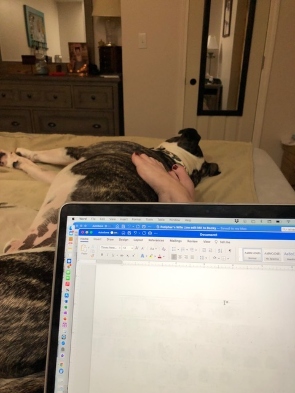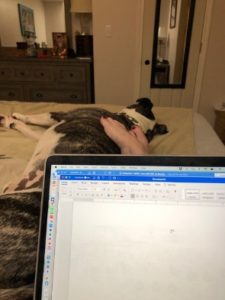Here’s my new world (at left), “quarantined” with Zekey in my bedroom. No, I don’t have Covid-19. I have a new disease that’s lasted far longer but isn’t life threatening: EDITS.
There’s no vaccine.
I’ve become pretty isolated and, frankly, a little obsessed with my circumstances. It’s been over four months of quarantine from family and friends. God provided a miracle and brought my regular line editor into the process to work alongside me. Praise Jesus!
But the “disease” remains. The edits must still be done, and the isolation continues…
What isolates you or captures your thought life? The struggles in your world may be different than mine.
Perhaps it’s divorce, unemployment, or a rift with your parent or teen/adult child. There are no vaccines for those either, but there IS something in God’s Word that broadened my perspective on the world around me and broke the chains of my self-imposed quarantine.
Big Story
The Bible is a BIG Book with lots of stories, but most of them begin with one man’s family: Abraham’s. God covenanted with Abraham to bless all nations–the whole world!–through his offspring, and it would be through that covenant line of Abraham’s descendants that the “serpent crusher,” promised in Genesis 3:15, would restore sinless communion between God and His Creation. The whole Bible—Old and New Testament—tells the story of God’s chosen family’s march toward the Serpent Crusher (Jesus) and how His Holy Spirit continues to build the Church as His Body on earth to one day reunite in that perfect communion with the Creator.
Check out this little video that tells the story of the Bible in less than ten minutes (and feel free to share it with others!).
One Family
It’s a BIG, BIG story! But Abraham’s twin grandsons—Esau and Jacob—became VERY focused on their small world. In fact, Esau lost sight of his role in the big story completely, demonstrated when he was hungry after a long day of hunting.
“‘Look, I am about to die,’ Esau said. ‘What good is the birthright to me?’” Genesis 25:32
Really? Tummy’s a little rumbly, and you give up the firstborn’s right to double the inheritance? Maybe it’s not such a surprise when God allowed Jacob to deceive Isaac into passing God’s Covenant blessing to him instead of Esau. Did God approve of deception? I don’t believe He EVER approves of sin; however, before the twin sons of Isaac were ever born, Elohim declared the younger would rule.
“The Lord said to [Rebekah], ‘Two nations are in your womb, and two peoples from within you will be separated; one people will be stronger than the other, and the older will serve the younger.’” Genesis 25:23
So, let’s see how Jacob and Esau can help us view God’s perspective on our world rather than obsess on the hard stuff.
Big Problems
Jacob lived a problematic life; however, our modern-day issues sometimes seem so vastly different than ancient Middle Eastern culture that it’s hard to relate. Let’s try to think of Jacob’s struggles in terms that apply to our lives:
- Daddy issues (Gen 25:28): his father blatantly favored his sibling; Jacob never felt as if he measured up to Esau’s “manly” prowess (Esau a hunter; Jacob among the tents—with women)
- Deception issues (Gen 25:26; 27:1-15): from birth, Jacob bore the name of “heel grabber,” which meant deceiver; and his mother, Rebekah, seemed to encourage it
- Disappointment with God (Gen 28:10-22): even after God proves His presence in a dream while Jacob is running for his life from Esau, Jacob gives God more ultimatums than trust
- Destructive relationships (Gen 29-31): though Jacob builds both his family and wealth in Haran, the relationships he endures there are as toxic as those in his parents’ camp
- Disobedience during the struggles (Gen 32-35): God called him to leave Haran and return to “the land of his fathers and to his relatives” (Gen 31:3); instead, he wandered through Canaan for many years, experiencing hardship after hardship, before finally returning to Isaac’s camp (either to bury Isaac or shortly before his death).
Little Interruption
While reading Genesis 25-35, I got completely wrapped up in Jacob’s troubles—and then came to a screeching halt in Genesis 36.
“This is the account of the family line of Esau (that is, Edom).” Genesis 36:1
Who cares? Evidently God did, or He wouldn’t have included forty-three verses about the “other brother.”
Within Esau’s genealogy, you’ll find three men with prominent roles in the Book of Job (according to some commentaries): Jobab (Job), Eliphaz, and Zepho (Zophar). Eliphaz, Esau’s firstborn son, is listed as one of the three “friends” who come to comfort Job—and do a poor job of it. Zepho (Zophar) is also listed in Job’s account as one of those three friends. In Gen. 36:15, we see Zophar would have been Job’s cousin, thirdborn son of Eliphaz.
Interesting information, but if your heart has been shattered by illness, divorce, a wayward child, or some other life-altering tragedy, the question arises again: WHO CARES?
Big Concept
The answer is also the same: GOD DOES.
When I came to Genesis 36 for my “quiet time with Jesus” reading, I dreaded all those names and seemingly useless facts. But what I received was a bigger picture of the twin brothers’ response to hardship. See if my journal entry makes sense to you:
Journal entry:
When Jacob stole Esau’s Covenant blessing, Esau’s pride fed his anger, and Jacob’s deceptiveness caused him to flee. Both began new lives in different locations (Jacob in Haran, and Esau in the hill country of Seir). Both had prolific families (Esau started years before Jacob)—seeming blessed by God with sons. However, both also continued hardship with each other and family.
Esau blended with peoples around him, squandering the distinctiveness God had blessed him and his family with. Jacob, because he removed himself for a time and took the hard journey to get the wives who knew of Elohim, maintained the unique spiritual distinctives passed down from Abraham and Isaac and was able to shelter and then pass down the Covenant blessing. Jacob was renamed Israel because he struggled with God and man. Struggle defined him, yes, but within those struggles, he remained uniquely his father’s son in a way Esau couldn’t—because Esau and his descendants took on the pagan qualities of the Canaanite women he married.
Today’s Big World, My Little Life
So, how could I use knowledge to form understanding and then apply understanding to life-transforming wisdom that heals . . . my editing disease? I’m still working on that. Here’s what I have so far.
- Pay attention to the “interruptions.” If I hadn’t slowed down to read the chapter about Esau, I would have missed a great lesson!
- Everyone endures life-altering struggles, but our reactions and results aren’t made in a personal vacuum. I must break quarantine with a Sabbath rest and step into the “real world” of other people’s lives. Intercede for others. Encourage. Be aware.
- Flip side: It’s sometimes necessary to pull away. Though hard for a people-pleaser, quarantine and isolation must sometimes take place to gain focus on God alone.
- My journey may not be like others’, but if I’m obedient to God’s directions, His sovereign plan is the best path for me. Jacob wasn’t his father’s favorite early in life, but he was the one who proved most faithful to both his father and God in the end.
Today’s Question:
- What spoke to you today from the post or from Jacob/Esau’s family and their struggles?





Comments 4
Thank you, once again, for interesting and unique insights into a well known story.
May God help you through this bout of editing illness. Looking forward to reading the final product!
Author
Thanks so much, Brenda! So glad you enjoyed the post. Praying that the Lord blesses your week!
Mesua I always love your wonderful insights. But this touched me in a special way when you pointed out the harder journey of being uniquely God’s. I’ve been struggling with that lately. Thank you for shining His light on that! And many blessings to you as you overcome your editing “illness”!
Author
We are certainly uniquely and wonderfully made–even in our little quirks and foibles. Thank you, Jesus, for that! ❤️ Blessings on you, dear one!